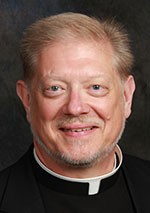That All May Be One / Fr. Rick Ginther
Lent is an opportunity to fully embrace the effects of salvation
 Lent, that great season of embracing more fully the effects of salvation in Christ, is upon us!
Lent, that great season of embracing more fully the effects of salvation in Christ, is upon us!
The effects of salvation in Christ are universal.
How does the Church express this truth?
On Nov. 21, 1964, the Church expressed this truth in “Lumen Gentium” (“Light of the Nations”), the Second Vatican Council’s “Dogmatic Constitution on the Church.”
We visited a portion of this document in my column in October 2020. At that time, I summarized the teaching.
As we embark upon the journey of Lent, let me offer the words the fathers of the council set down for us in paragraph 16:
In his wisdom and goodness, the eternal Father created the whole world according to his supremely free and mysterious purpose and decreed that men should be raised up to share in the divine life.
When they fell in Adam, he did not abandon them but always kept providing them with aids to salvation, in consideration of Christ, who is the image of the invisible God, the firstborn of all creation.
Before the ages, the Father already knew all the elect and predestined them to be made into the likeness of his Son, so that he should be the firstborn among many brothers.
God resolved to gather into holy Church all who believe in Christ. The Church, foreshadowed even from the beginning of the world, so marvelously prepared in the history of the people of Israel, established in these last times and revealed by the outpouring of the Holy Spirit, will be made perfect in glory at the end of time.
Then, as we read in the Fathers of the Church, all the righteous from Adam onward—from Abel, the righteous, to the last of the elect—will be gathered in the universal Church in the presence of the Father.
Finally, those who have not yet received the Gospel are in their different ways related to God’s people.
In the first place, there is that people which was given the covenants and the promises and from which Christ was born by human descent: the people which is by God’s choice most dear on account of the patriarchs. God never repents of his gifts or his call.
God’s plan of salvation embraces those also who acknowledge the Creator. Among these are especially the [Muslims]; they profess their faith as the faith of Abraham, and with us they worship the one, merciful God who will judge men on the last day.
God himself is not far from those others who seek the unknown God in darkness and shadows, for it is he who gives to all men life and inspiration and all things, and who as Savior desires all men to be saved.
Eternal salvation is open to those who, through no fault of their own, do not know Christ and his Church but seek God with a sincere heart, and under the inspiration of grace try in their lives to do his will, made known to them by the dictates of their conscience.
Nor does Divine Providence deny the aids necessary for salvation to those who, without blame on their part, have not yet reached an explicit belief in God, but strive to lead a good life, under the influence of God’s grace.
Whatever goodness and truth are found among them is seen by the Church as a preparation for the Gospel, and as given by him who shines on all men, so that they may at last have life.
“Remember, you are dust, and to dust you will return”—words we may hear on Ash Wednesday. This ritual sentence is a reminder of our common humanity. May those ashes also remind us of the universal effects of salvation in Christ.
(Father Rick Ginther is director of the archdiocesan Office of Ecumenism and Interreligious Affairs. He is also the pastor of Our Lady of Lourdes Parish in Indianapolis.) †
 Lent, that great season of embracing more fully the effects of salvation in Christ, is upon us!
Lent, that great season of embracing more fully the effects of salvation in Christ, is upon us!